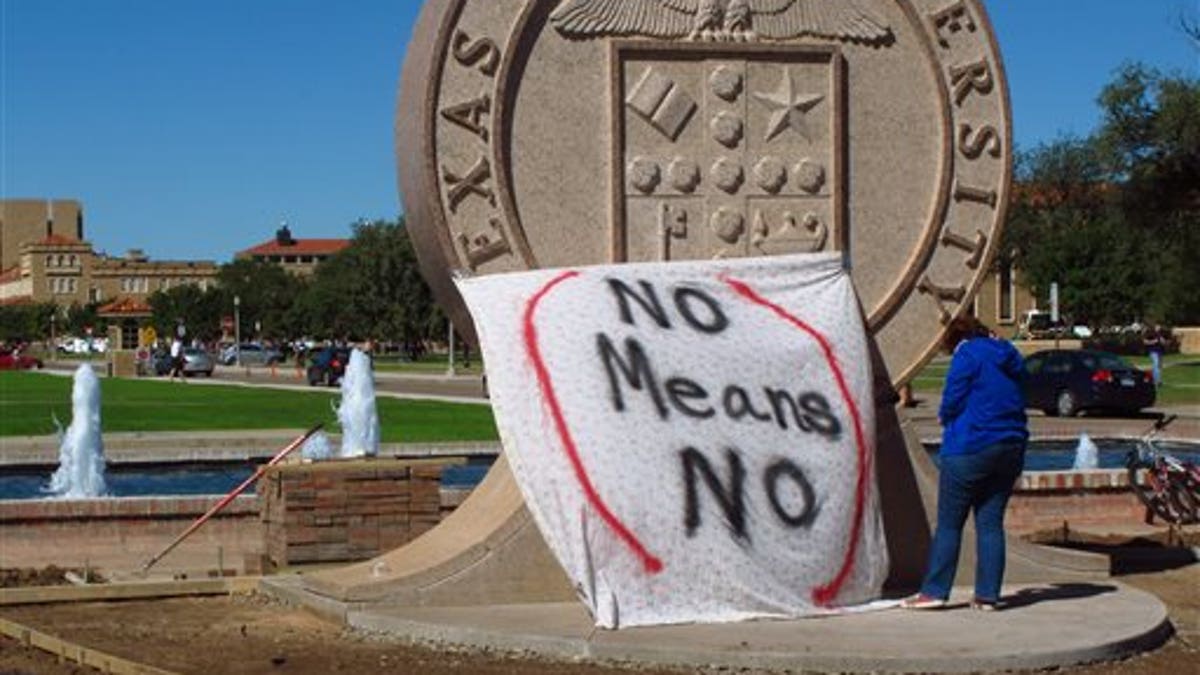
FILE - In this Wednesday, Oct. 1, 2014 file photo, Texas Tech freshman Regan Elder helps drape a bed sheet with the message "No Means No" over the university's seal at the Lubbock, Texas campus to protest what students say is a "rape culture" on campus. (AP Photo/Betsy Blaney)
Over the past few years, there has been much discussion about the problem of rape on college campuses.
Media outlets have covered the crisis, Rolling Stone magazine published a piece meant to expose the problem (but instead exposed their inadequacies and bias) and the White House created a Task Force to address the issue.
That Task Force focused on men. The executive summary offered the following action steps:
1. Identifying the Problem.
2. Preventing Sexual Assault--and Engaging MEN.
3. Effectively Responding.
4. Increasing Transparency and Improving Enforcement.
Yet, there is no focus on empowering women, and in fact the summary talks about empowering men to step in when a woman is in trouble.
The idea that men, or campus police, or the White House or the media is better suited to meet my needs than I am is preposterous. Women can meet their own needs, and this peer reviewed medical study shows that to be true when it comes to campus rape as well.
The fear of victim blaming is so great that rather than talk about empowering women, the White House Task Force talks about empowering men to save women. And the media follows suit.
If one dares to say that women should be more aware, drink less, use the buddy system and avoid risky situations they run the risk of being called anti-women. But now we have proof that women are the ones with the power to stop campus rape--and no one is talking about it.
The New England Journal of Medicine, a well-known peer reviewed journal, published a study regarding a Sexual Assault Resistance Program that was done in Canadian universities.
Women in the study were taught to assess risk of sexual assault, acknowledge dangerous situations and how to defend themselves both verbally and physically. There were 893 first year students in the study, and 451 were given instruction. The results were phenomenal. The risk of rape for those in the study group was 5.2% versus 9.8% for those not in the group, and the risk of attempted rape was 3.4% versus 9.3 percent. This study should be replicated and this program should be part of every first year university female student's curriculum.
This study should be on the front page of the paper and the top story on the evening news. We have a problem at our campuses, and now we have a solution that works.
Instead, it was buried in the Health section of the New York Times. When other media outlets covered it, they did so critically. Buzzfeed's headline read "Study Places Success of College Rape Prevention Program on Victims". Vox's was similar "Teaching women to avoid rape works, but it's controversial". Well it shouldn't be and to say such a thing does an enormous disservice to women.
I majored in psychology in college, and was fascinated by Abraham Maslow's hierarchy of needs. The idea was that there were certain needs that needed to be met to reach self-actualization, which is the pinnacle of human happiness. The basic needs are food, water, shelter, and safety.
Here, we have a study that helps women to meet the basic needs of shelter and safety. As we move up the hierarchy we encounter the need for confidence, achievement, respect of others and self-esteem.
Anyone who refuses to accept that women have control over their own destinies and that they can be empowered is taking away a woman's ability to achieve that need.
The idea that men, or campus police, or the White House or the media is better suited to meet my needs than I am is preposterous. Women can meet their own needs, and this peer reviewed medical study shows that to be true when it comes to campus rape as well.
Some feminists have objected to this study, saying that it puts the burden on victims.
I disagree.This gives women the power to no longer be victims and that is everything.
The White House Task Force wants to empower men? Enough of that. I say empower women with knowledge and self-control. Call that victim blaming if you like.
